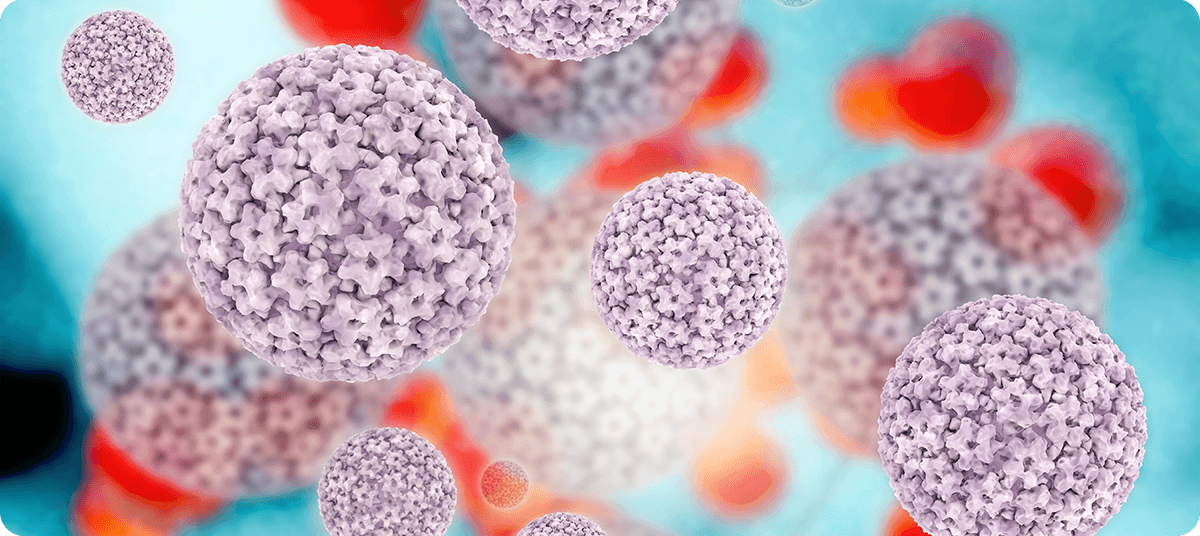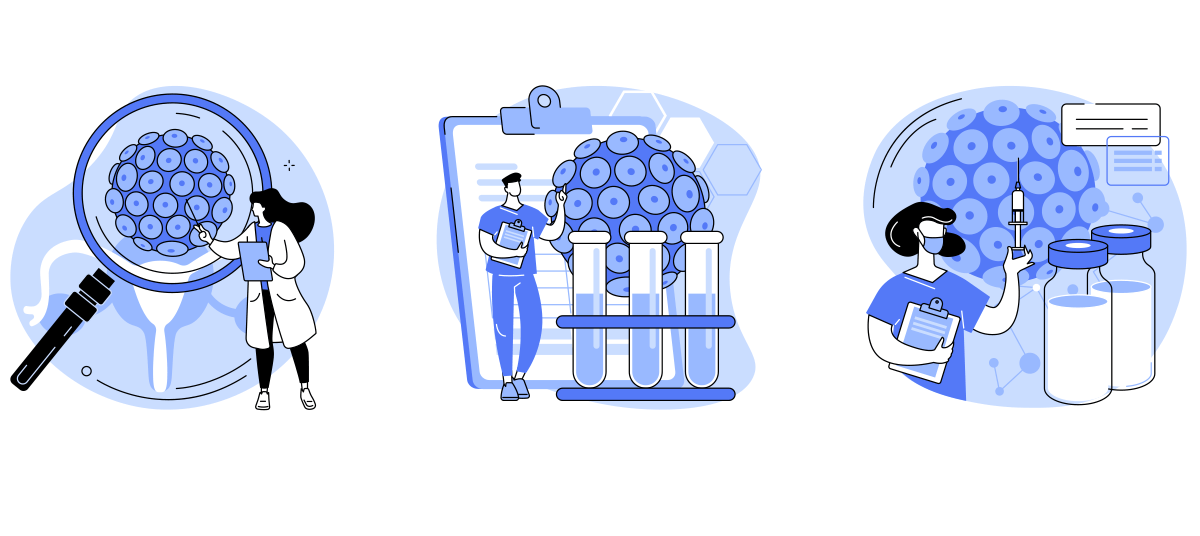HPV test in the early detection of cervical cancer
The HPV test
Your gynaecologist has given you an HPV test and now you’re wondering what it is. The test for human papillomaviruses, HPV for short, has only been standard in cervical cancer screening for a few years. But what does HPV have to do with cancer and who is entitled to a test? This article answers the most important questions about the HPV test.
How can you get tested for HPV?
The human papillomavirus test (HPV test) is a standard part of cervical cancer screening for women age 35 and over. The costs of the HPV test are therefore covered by health insurance companies. A years-long HPV infection can pose a cancer risk, so women age 35 and over go to their gynecologist every three years for cervical cancer screening. In most cases, an infection with HPV is harmless and heals on its own.
Who can go for cervical cancer screening?
In Germany, cervical cancer screening is divided into two age groups and is covered by health insurance.
Women aged 20 to 34 can have an annual Pap smear.
From the age of 35, women receive a combination examination, also known as co-testing. This consists of the Pap smear and the HPV test and is carried out every three years.
In addition, all women aged 20 and over can have their external and internal genital organs examined annually as part of cervical cancer screening.
What does the HPV test examine?
An HPV test only detects whether human papillomaviruses are present in the cervix – if this is the case, then you have an HPV infection.
At first, this might sound worrying, but you are not alone with this diagnosis. Almost everyone is infected with HPV at least once in their life. It‘s also completely normal that you haven‘t noticed your infection. HPV can run its course without symptoms and usually goes away on its own.
In rare cases, however, an HPV infection can lead to cervical cancer. But this only happens if it becomes chronic, which means it lasts for years.
By the way: HPV can also cause warts to develop in the genital area. These are unpleasant, but fortunately harmless.
What does it mean if the HPV test is positive?
A positive HPV test only means that you have an HPV infection.
Now discuss your situation with your gynecologist: For example, what is your Pap test result? If it‘s normal, your doctor will probably advise you to repeat the cervical cancer screening at shorter intervals. If your HPV test is negative and your Pap smear is still normal, then you can breathe a sigh of relief. Your infection has cleared up without any consequences.
The GynTect® test
Quick verification
in case of suspected
cervical cancer
What does HPV have to do with cervical cancer?
Human papillomaviruses are considered to be the main cause of cervical cancer. But stay calm! In most cases, an HPV infection heals on its own.
An HPV infection must persist for years for abnormal cells to develop on the cervix. Even then, slight cell changes can clear up on their own. In rare cases, however, they do not disappear and can become precancerous and eventually cancerous.
That sounds frightening. But this years-long process has one advantage: you have time to detect cervical cancer early, ideally in its preliminary stages.
High-risk HPV types can cause cervical cancer
There are more than 200 different types of HPV, but not all of them are dangerous. Only 12 types are classified as so-called high-risk HPV types and are responsible for causing cervical cancer.
For this reason, a test at the gynaecologist does not detect all HPV types, but focuses only on those that are dangerous. Don’t panic! Even an infection with a high-risk HPV type can heal on its own!
Considering the above, it is easier to understand the statement that almost everyone is infected with HPV at least once in their life. Most people don‘t notice their infection because it disappears without any consequences.
How can I protect myself against an HPV infection?
Human papillomaviruses are transmitted sexually. Unfortunately, condoms only offer a low level of protection. This is because the viruses are found on the skin and mucous membranes which are only partially covered by a condom.
The safest protection against an HPV infection would be abstinence. But understandably, this is not an option for most people. For this reason, you should keep two things in mind to protect yourself from an HPV infection:
- The HPV vaccination protects against high-risk types. If possible, it should be carried out before your first sexual experience.
- Cervical cancer screening: This does not protect you from an HPV infection.
However, with the help of the HPV test, the risk of cancer can be determined and, if necessary, a timely response can be made. A cervical cancer screening is also important for women who have been vaccinated.
HPV test vs. Pap smear
The HPV test and the Pap test are both used for cervical cancer screening. You will not notice any difference at your gynaecologist’s whether a sample is taken for a Pap test or an HPV test. In both cases, the woman sits in the treatment chair. A kind of brush is inserted into the vagina and stroked over the cervix. Cells from the mucous membrane remain attached to the brush and are then analyzed in a laboratory.
Pap test:
Examines the swab sample under the microscope for cell changes.
.
HPV test:
Examines whether an infection with human papillomavirus is present.
Conclusion
Did you test positive for HPV during cervical cancer screening? Since HPV can cause cervical cancer, you now know that you belong to the risk group. But take a deep breath: A positive HPV test does not automatically mean that you have cancer or a precancerous condition. It‘s possible that your infection will clear up on its own. You should now discuss next steps with your gynaecologist.
Order GynTect®
Contact us, to get GynTect®
On request, you will receive a free smear test kit, which is accompanied by a treatment contract. Only when we have received the swab sample together with the signed examination request in the laboratory do you undertake to pay the costs of 150 euros.
Do you have any further questions? Please use the contact options provided.
Epitype GmbH
Löbstedter Str. 41
07749 Jena
Germany
Contact us if you have any further questions:
Picture credits
- Titelbild: MIA Studio / Shutterstock.com
- Abstrichbürstchen: Africa Studio / Shutterstock.com
- Modell HPV-Viren: xrender / Shutterstock.com
- Schema HPV: Net vector / Shutterstock.com







